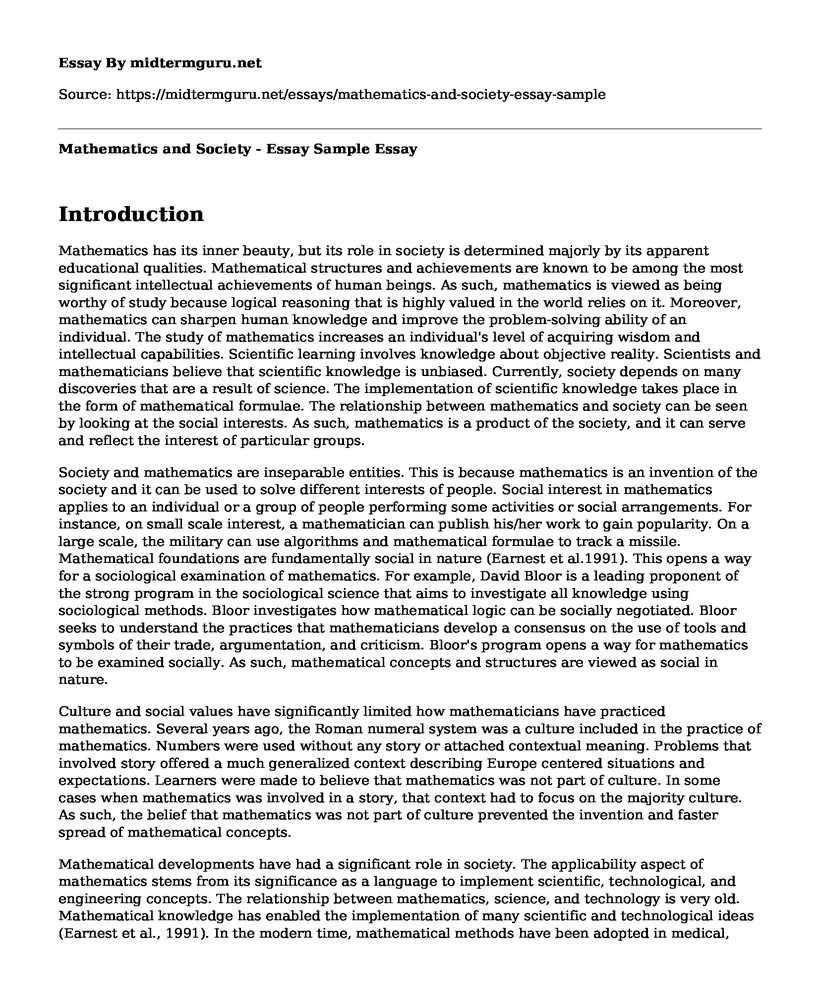Introduction
Mathematics has its inner beauty, but its role in society is determined majorly by its apparent educational qualities. Mathematical structures and achievements are known to be among the most significant intellectual achievements of human beings. As such, mathematics is viewed as being worthy of study because logical reasoning that is highly valued in the world relies on it. Moreover, mathematics can sharpen human knowledge and improve the problem-solving ability of an individual. The study of mathematics increases an individual's level of acquiring wisdom and intellectual capabilities. Scientific learning involves knowledge about objective reality. Scientists and mathematicians believe that scientific knowledge is unbiased. Currently, society depends on many discoveries that are a result of science. The implementation of scientific knowledge takes place in the form of mathematical formulae. The relationship between mathematics and society can be seen by looking at the social interests. As such, mathematics is a product of the society, and it can serve and reflect the interest of particular groups.
Society and mathematics are inseparable entities. This is because mathematics is an invention of the society and it can be used to solve different interests of people. Social interest in mathematics applies to an individual or a group of people performing some activities or social arrangements. For instance, on small scale interest, a mathematician can publish his/her work to gain popularity. On a large scale, the military can use algorithms and mathematical formulae to track a missile. Mathematical foundations are fundamentally social in nature (Earnest et al.1991). This opens a way for a sociological examination of mathematics. For example, David Bloor is a leading proponent of the strong program in the sociological science that aims to investigate all knowledge using sociological methods. Bloor investigates how mathematical logic can be socially negotiated. Bloor seeks to understand the practices that mathematicians develop a consensus on the use of tools and symbols of their trade, argumentation, and criticism. Bloor's program opens a way for mathematics to be examined socially. As such, mathematical concepts and structures are viewed as social in nature.
Culture and social values have significantly limited how mathematicians have practiced mathematics. Several years ago, the Roman numeral system was a culture included in the practice of mathematics. Numbers were used without any story or attached contextual meaning. Problems that involved story offered a much generalized context describing Europe centered situations and expectations. Learners were made to believe that mathematics was not part of culture. In some cases when mathematics was involved in a story, that context had to focus on the majority culture. As such, the belief that mathematics was not part of culture prevented the invention and faster spread of mathematical concepts.
Mathematical developments have had a significant role in society. The applicability aspect of mathematics stems from its significance as a language to implement scientific, technological, and engineering concepts. The relationship between mathematics, science, and technology is very old. Mathematical knowledge has enabled the implementation of many scientific and technological ideas (Earnest et al., 1991). In the modern time, mathematical methods have been adopted in medical, physical, and social sciences confirming that mathematics is an integral part of society. Mathematical knowledge is needed for statistical modelling of phenomena. Such modelling is required in all engineering aspects and plays a critical role in physical sciences. As such, mathematics contributes broadly in medicine, economics, biological sciences, and psychology. Mathematical techniques have enabled the implementation of mathematical models in computing. For example, logical design, robotics, and algorithmic analysis have enabled large scale scientific computation.
Reference
Ernest, P., Skovsmose, O., Van Bendegem, J. P., Bicudo, M., Miarka, R., Kvasz, L., & Moeller, R. (1991). The philosophy of mathematics education.
Cite this page
Mathematics and Society - Essay Sample. (2022, Dec 21). Retrieved from https://midtermguru.com/essays/mathematics-and-society-essay-sample
If you are the original author of this essay and no longer wish to have it published on the midtermguru.com website, please click below to request its removal:
- Research Paper on Communication of Different Cultures
- Paper Example on Social Change
- How Communication Is Central To Research in My Discipline? - Paper Example
- Report on Math
- Criminal Justice System: Ensuring Safety & Well-Being of Society - Essay Sample
- Globalization: Integration of Economies & Societies - Research Paper
- Human Agency in Anthropology: Free Agent or Social Structure? - Essay Sample







